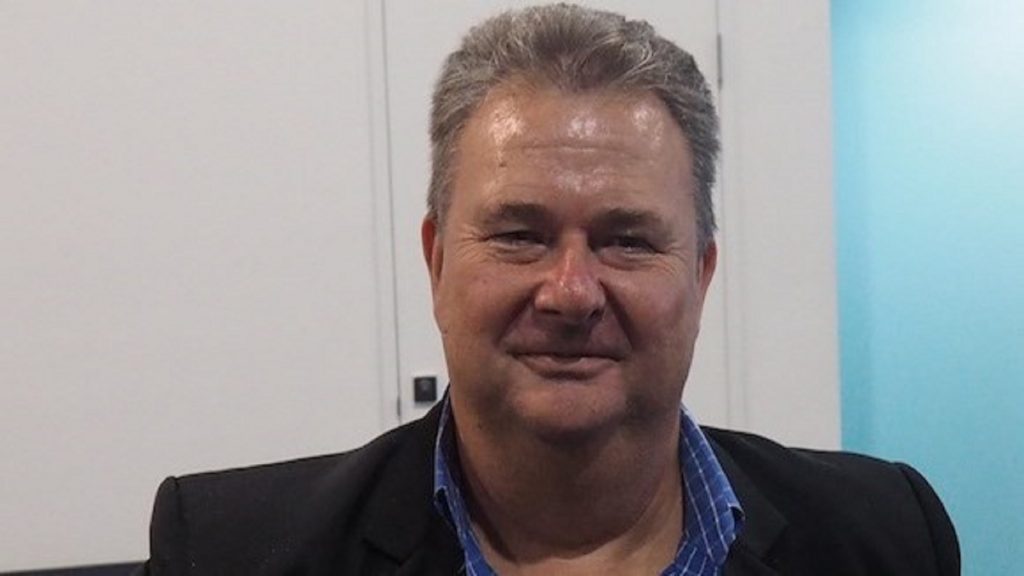
Papua New Guinea agribusiness Mainland Holdings is launching into new agricultural sectors to reduce its reliance on imports. Chief Executive David Alcock told the Australia Papua New Guinea Business Forum that the company intends to grow sorghum and soya beans to use as stockfeed in partnership with local farmers.

Mainland Holding’s David Alcock. Source: BAI
‘We have an over-reliance on imported grains,’ Alcock said. ‘Foreign currency has become very difficult to source.
‘One large bank, when I asked them for assistance, said: “We can’t provide any assistance.”
‘I asked them what would they do if they were in my position and they said: “Grow something.”
‘We decided to see the foreign exchange as an opportunity rather than a difficulty.’
‘I thought about that for a while and came back thinking maybe they had a clue there.’
Yields
Alcock said Mainland, the diversified agribusiness behind the Tablebirds poultry brand, has significant land that could be used for such an initiative. The initial costings suggested that the company would be able to achieve similar yields to those in Australia.
‘We decided to see the foreign exchange as an opportunity rather than a difficulty that could not be overcome.‘
Alcock acknowledged that farming attempts in the 1970s and 1980s in PNG had failed, but improvements in technology have changed the prospects.
‘Since 1981, a lot has happened in agriculture. Crop yields have gone up immensely and methods of crop management have improved markedly.’
‘PNG is not new to farming; PNG was farming before Australia.’
Alcock says expert help was sought, especially with techniques for eliminating pests. There was high level support within the company for the initiative, which he described as ‘very important.’
The first trial, in the Markham Valley, was undertaken last June and the second trial was in November. The company planted 800 hectares in March this year.
‘Sorghum is the crop that we have decided to start with. We will also look at soya beans.
‘We can plant in October and plant in February and get two crops.
‘PNG is not new to farming; PNG was farming before Australia.
‘The aim is to farm 1500 hectares a year.’
‘So the initiatives are there, and the positive assistance is there. All people need is help and guidance.’
Feed

Sorghum crop
Alcock said Mainland Holdings imports 150,000 tonnes of Australian wheat each year. Of this, 60,000 tonnes is used in stock feed.
‘Sorghum, our replacement for wheat in stock feed, will grow in PNG. That is absolutely proven. Soya beans, a critical protein addition to stock feed, will also grow in PNG.
‘If you can grow those two, you would have an enormous impact on the price of stock feed and the amount of industry you can create.
The aim is to farm 1500 hectares a year. ‘With two crops a year, it will give us 15,000 tonnes of sorghum.
‘That is a quarter of our needs to replace all of our wheat in our stock feed. We have very ambitious goals.’
Phases
Alcock said the aim is to develop local farming, which will be undertaken in four phases.
‘In Phase 1, we want to lease the land at an agreed rate. Phase 2 is we teach the farmers to farm.
‘That is already happening on our farms but we want it to happen on other peoples’ farms.
‘Phase three, they own the farms with us in a partnership and we use the proven yields and track record we have got to invest in improvement.
‘Phase 4, they take over the farming, we just buy the product. Our main role is to sell our chicken and our stock feed and our eggs so we are happy to share the farming.
‘We see this as an opportunity to grow through that curve and [for it to] become more and more lucrative for the farmers.’
Alcock said Mainland only has 2000 hectares of its own land and its aim is to have 41,000 hectares farmed.
‘This is about profitability and foreign exchange elimination.’
‘It would greatly help if we could get landowner groups to make the land available to us.’
Cost control
He said the company is advertising for landowners and outgrowers who are willing to offer land.
The move into growing stockfeed is a way to maintain cost control and control over prices.
‘We believe we can bring sorghum to the feed mill at around K600 a tonne; wheat from Australia at the moment is K1000 a tonne.
‘This is about profitability and foreign exchange elimination.’


